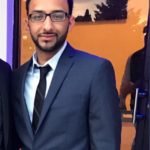Zagham Chaudry has always wanted to fight for the rights of others, but when his own rights were put into question after 9/11, everything changed. In his story, Chaudry shares how his civil rights felt like they were taken away, and how being optimistic and respectful, but with a powerful voice, helped him turn things around. This story is part of MALA’s scholarship essay contest. To see more scholarship essays, click here.
I have always wanted to stand up for peoples’ rights. Growing up, every year in history class, there was no topic I looked forward to learning more about than the civil rights movement. I had even memorized Dr. King’s “I Have a Dream” speech. However, my naïve and romanticized view of what it meant to fight for civil rights and liberties quickly fell by the wayside after 9/11. Suddenly, many Americans began to see even the very existence of Muslims in this country as unacceptable. As an American Muslim, my life changed overnight.
I was in the third grade when 9/11 happened, and I was teased and bullied throughout high school simply because I was Muslim. After high school, when I thought the nightmare was finally over, news broke out about how a special unit of the NYPD was spying on Muslim students at the college I was enrolled in. None of this made any sense. I had not done anything wrong. I am an American citizen. Why was I being treated like this? I was afraid. My parents were afraid. They advised me not to get involved with Muslim organizations on campus or go to student protests, fearing that I may get caught up in something. You can imagine how difficult this must have been for a first-generation American who grew up being told by his parents that this is the greatest country in the world. Nevertheless, I remained optimistic. I was optimistic because no matter how difficult things got, there were always good people who defended me. Yes, there were bullies, but there were also those who stood up to those bullies with me. Yes, there was unconstitutional spying, but there were also organizations like MALA that stood with American Muslims.
Rather than allowing myself to be discouraged by everything that was going on, I decided to turn around and help others who were going through what I had gone through. After law school, I want to work as a civil rights attorney. Because I was helping the community, I was appointed as a county director of the NJ Democratic Party’s South Asian American Caucus. As county director, through public speaking and voter registration drives for example, I urged the South Asian Muslim community to be more aware of what was going on, to educate themselves on their rights and to organize themselves in order have a more powerful voice.


